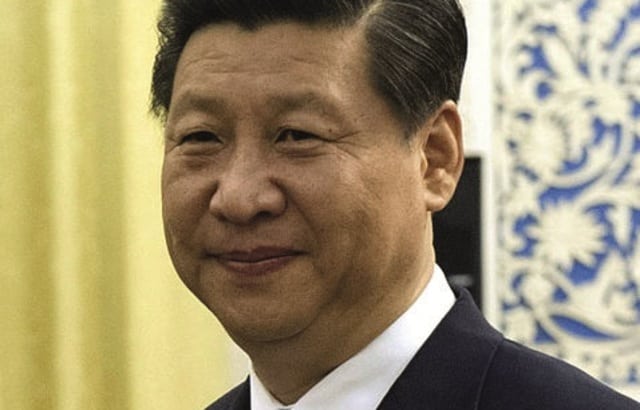Xi kicked off the 19th Communist Party congress and the first day of his second term, reflecting on how far the country has come during his five years in office.
“The Chinese nation now stands tall and firm in the East,” he proclaimed to the 2,300 delegates present in a speech that lasted more than three hours.
Xi’s message of innovation, progress and rejuvenation is frankly a welcome relief from the isolationist, divisive rhetoric being dispensed by many leaders and major political parties in the West, like America’s Twitter obsessed commander in chief.
However, the pool of foreign investors Xi needs to woo with his hopeful narrative seemed largely split on whether or not China had “entered a new era” as its leader claimed.
Part of that change starts at home, an Xi’s critics are quick to point out that up until this point there has been minimal reform in the region.
China’s challenges
China’s sky-high debt levels and over-heated property market are two major challenges facing Xi’s administration. And there’s still the issue of tackling the region’s rampant air pollution in Beijing, which the Chinese president conceded remained at “unhealthy” levels during his speech on Wednesday.
“China has already attempted reform under Xi Jinping,” notes Craig Botham, emerging markets economist at Schroders.
“The 2013 Third Plenum saw the announcement of a substantial reform package, little of which has been implemented despite the presence of reform-minded individuals like Li Keqiang, Lou Jiwei, and Zhou Xiaochuan. At least two of these will probably depart after this congress.”
There are two schools of thought about why Xi’s earlier reforms failed to materialise, says Botham.
Either the Chinese leader values growth and stability above efficiency and reform and therefore will not change course if these objectives are being met. Or perhaps “Xi Jinping is not so powerful as imagined by the West, and is in fact constrained by internal politics”.
“Our own view tilts toward the former explanation,” says Botham. “Xi’s history suggests he is a pragmatist rather than idealist when it comes to economic policy.”
As such, Botham expects more of the same from the man formerly known as “Big Daddy Xi” (before the Chinese propaganda chiefs forbade state-controlled media from using the moniker).
That is: “Consolidation of power, both political and economic (partly through mergers of state-owned enterprises [SOEs]); an attempt to grow out of the existing debt problem by channelling credit to consumer and new industries while slowly closing inefficient SOEs; and policy tinkering to keep growth at an acceptable level (probably between 6 and 6.5%).”
“This approach can probably work a while longer, but on the current path we expect serious concerns to surface around 2020,” Botham adds.
Progress on debt
On the debt front, Fidelity International fixed income portfolio manager Bryan Collins points out that progress has been made during Xi’s first term.
“This is a known challenge for China and one where we are seeing proactive initiatives being taken to manage risks, including the development of domestic capital markets to improve the cost and allocation of capital.”
Collins also notes that most of China’s debt is renminbi denominated and tied to public sector institutions, meaning it is in the control of the government and less risky, as a consequence.
“While deleveraging can impact growth, it typically represents ideal conditions for fixed income and credit investing,” he adds.
China remains attractive
Encouraging growth is one of the reasons China has caught the eye of foreign investors of late.
Although Gary Greenberg, head of emerging markets at Hermes Investment Management, views the latest congress as “an economic non-event”, he also believes “the outlook for China in the medium to long term is better than the bears think”.
China remains attractive due to several secular long-term themes, “which are structurally changing the Chinese economy” and “have their avatars in a number of attractive Chinese companies”.
“Almost all of the innovation in emerging markets is happening in Asia,” said Greenberg.
“Only 1% of the emerging markets’ information technology sector is based outside of the region. China, in particular, is rapidly moving towards an innovative economy – with the proportion of intangible assets to total market capitalisation rising rapidly.
“A major reason for this is that the free cashflow available to Chinese companies allows them to ramp spending on research and development, which is rapidly approaching parity with the US. This is one of the many factors which has allowed China to increase its share of high-value exports and become the largest e-commerce marketplace in the world.”
“If Xi can push through reforms of SOEs and change-management incentives to focus on delivering shareholder value, many of the companies regularly dismissed by foreign investors will come back into focus,” agrees Eric Moffett, T Rowe Price Funds Asian Opportunities Equity Fund manager.
“The authorities are already testing reforms, with China Unicom being one of the companies undergoing significant reform. This could be a catalyst for more reform.”
Besides that, Moffett believes the boom of free cashflow from Chinese companies “is still underappreciated and undervalued by the market”.
Unstable property
But China’s ramped-up innovation in the corporate sphere could be a moot point if the government cannot get a handle on the property sector mania, which Greenberg says, “could result in economic dislocation”.
“The risk isn’t in continuing with reforms; it’s the direction of property that will be key for investors to watch over the next five years,” comments Fidelity International investment director, Catherine Yeung.
“Property remains the anchor for China as most things are collateralised against property. We could see policies aimed at smoothing the property cycle or the introduction of tools that will be required for stabilisation. This could be in the form of tax mechanisms or a long-term rental programme.
“Whatever policies are introduced, they need to be timely and balanced. Too much or too soon could weigh on buyer psychology.”













